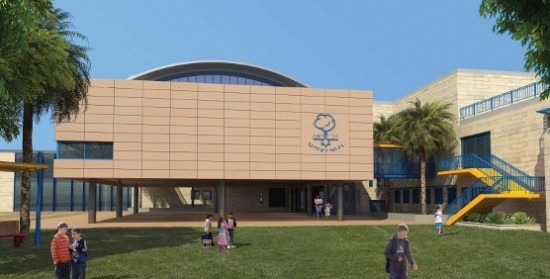The Anglo Influence: The TALI School in Raanana
The recent opening of the beautiful new Frankel TALI school in Raanana is not only a testament to hard work, vision and determination, but also to the fact that Anglo immigrants, in spite of language and cultural differences, can indeed make a difference.
Hannah and David Schwartz, two of the visionaries behind the project - which took 14 years to complete -- describe it as a "dream come true."
"We came on aliya from the U.S. in 1992 and had trouble finding a framework in which we felt comfortable," David says. "We didn't fit in with the religious community or with the secular community, and our friends had the same issues. We formed a social group which we called the 'nishta' group (from the Yiddish 'nisht ahin, nisht aher,' meaning 'neither here nor there')."
In terms of education for their four children, Hannah says, "As an educator in the U.S., I know how to be Jewish, but here, I felt lost. People told me that we would get used to the educational system, but I couldn't. I thought, let's try to change it. At one discussion we heard about the TALI school philosophy. It seemed just what we were looking for, but the nearest TALI school was in Hod Hasharon, and that was far away. We decided that we would work to establish one in Raanana."
Within a few months, the TALI Raanana nonprofit association was established. TALI, the Hebrew acronym for "Enhanced Jewish Studies," is a study program that is part of the secular public education system, but which, in addition, emphasizes Jewish and traditional values. Some 60 TALI institutions exist today in Israel, taking in more than 22,000 children from pre-kindergarten to high school.
According to TALI Raanana's chairperson, Rachel Oren, "TALI Raanana's curriculum expands and enriches the Education Ministry's core program with supplementary Jewish studies in the spirit of pluralism. TALI Raanana reflects the wishes of the parents who are interested in educating their children to become proud Israelis who are connected to their Jewish roots and who know how to integrate the unique values of the Jewish and Israeli society."
Of course, establishing a new school is easier said than done.
At first, the municipality agreed to initiate a TALI stream in a local school. "We then had to pitch the idea ourselves, and got rejected by schools right and left for a variety of reasons," says Hannah. Finally, they succeeded in starting a kindergarten in 1997 and a first-grade class within an established elementary school, the Meged School. Within five years, there were already three kindergartens and more than 180 elementary school students.
Still, having one principal for two streams within a school wasn't the solution, and in 2004, the committee began to explore the possibility of a school of their own. They invited Barbara Levin, the founder and principal of the first TALI school in Israel, located in Jerusalem, to come to Raanana and help them develop a plan. She then introduced them to Stanley Frankel who would become their chief donor. Frankel is a member of a philanthropic family from Michigan which has funded numerous Jewish education causes, including the TALI Jerusalem school.
With student numbers growing, Raanana city officials eventually agreed in principle to the establishment of a TALI school, and in 2009, when the Raanana College premises were no longer needed for the Open University, the city council offered the building to TALI.
At a cost of NIS 20 million, the building was extended and completely renovated to standards seldom seen in Israel. It boasts features such as patios outside classrooms for the youngest children, state-of-the-art green environmental elements, computers for students in every room, science and music rooms, a library and a multi-purpose Beit Midrash which serves as a synagogue, gathering place and auditorium. The new principal, Yigal Aricha, who is observant, worked for four years at Beth Tfiloh Dahan Community School, a pluralistic Jewish day school in Baltimore.
So who are the children who attend TALI? This year, there are 260 students in elementary school and 150 in four kindergartens. Although most of the original families were from English-speaking countries, today more than half are native-born Israelis.
"Many parents are secular, but they want their children to know about Jewish culture in depth," explains Hannah. "Some have spent time overseas and are familiar with the model of the Jewish day school. Other parents are religious and are not satisfied with the local dati (religious) schools, or find the trend to increased haredi (ultra-Orthodox) influence disturbing. There are prayers every day and extra hours of limudei kodesh (religious instruction), but they are egalitarian. TALI offers an opportunity to experience and be exposed to Judaism without extremes. We can respect our differences."
The work is continuing: Parents are now exploring options in extending the program to the junior high school level. But the Schwartz's, who have four children, take justifiable pride in what they and the others with whom they worked have accomplished.
"Recently, my children were invited to three bar and bat mitzvas," says Hannah. "One was in an Orthodox synagogue, one in a Conservative and one in a Reform. And they were comfortable in all three."
Now that's pluralism.








Comments